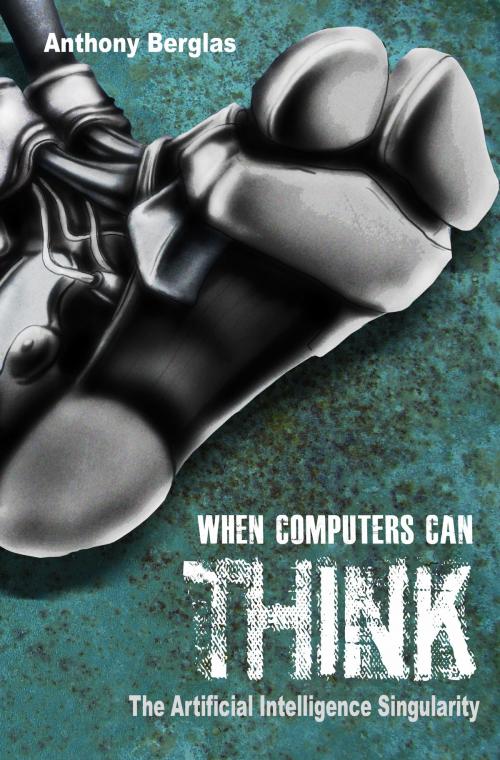When Computers Can Think, the Artificial Intelligence Singularity
Nonfiction, Computers, Advanced Computing, Artificial Intelligence, Science Fiction & Fantasy, Science Fiction| Author: | Anthony Berglas | ISBN: | 9781311332912 |
| Publisher: | Anthony Berglas | Publication: | February 28, 2015 |
| Imprint: | Smashwords Edition | Language: | English |
| Author: | Anthony Berglas |
| ISBN: | 9781311332912 |
| Publisher: | Anthony Berglas |
| Publication: | February 28, 2015 |
| Imprint: | Smashwords Edition |
| Language: | English |
Could computers ever really think? They can now drive cars on suburban streets, control spaceships and have even won the Jeopardy! game show. But could they ever be self aware, create original ideas, develop their own goals, and write complex computer programs?
Why can't computers already think? Why has 60 years of research failed to produce a single intelligent robot? What has been learnt, what are the technically difficult problems, and when are they likely to be solved?
What would computers think about? What would be their challenges, goals and aspirations? They certainly would not need children. Would they need us?
This book addresses the unseen elephant in the room. Computers are becoming ever more intelligent. The future will not be anything like it used to be.
The book differs from other recent works by providing a strong focus on what caused people to ultimately be the way we are, namely upon natural selection. It then attempts to predict how natural selection would condition an intelligent machine's behaviour by considering the very different world that it would experience.
Several technical and rhetorical arguments are presented both for and against the hypothesis that computers will, eventually, be able to think. There is also some discussion about what it actually means to be intelligent and the limitations of terms such as “creative” and “self aware”.
The second and largest part of the book then describes existing AI technologies in some detail. These include symbolic and logic based approaches, Bayesian expert systems, vision, speech, robotics, and an overview of computational neuroscience. This provides a more realistic basis for predictions of the future as well as simply gaining a better understanding of what intelligence actually is. It helps ground abstract philosophical discussions in terms of real, practical technologies. The text is moderately technical while being aimed at the general reader.
The book also posits that intelligent machines will be developed as succession of ever more intelligent software tools that are released and used in the real world. The book then analyzes the medium term effects of those semi-intelligent tools upon society. This includes some surprising results from an historical review of existing technologies.
There is a growing awareness of these issues, with concerns recently raised by physicist Stephen Hawking, Microsoft founder Bill Gates, and billionaire Elon Musk.
Could computers ever really think? They can now drive cars on suburban streets, control spaceships and have even won the Jeopardy! game show. But could they ever be self aware, create original ideas, develop their own goals, and write complex computer programs?
Why can't computers already think? Why has 60 years of research failed to produce a single intelligent robot? What has been learnt, what are the technically difficult problems, and when are they likely to be solved?
What would computers think about? What would be their challenges, goals and aspirations? They certainly would not need children. Would they need us?
This book addresses the unseen elephant in the room. Computers are becoming ever more intelligent. The future will not be anything like it used to be.
The book differs from other recent works by providing a strong focus on what caused people to ultimately be the way we are, namely upon natural selection. It then attempts to predict how natural selection would condition an intelligent machine's behaviour by considering the very different world that it would experience.
Several technical and rhetorical arguments are presented both for and against the hypothesis that computers will, eventually, be able to think. There is also some discussion about what it actually means to be intelligent and the limitations of terms such as “creative” and “self aware”.
The second and largest part of the book then describes existing AI technologies in some detail. These include symbolic and logic based approaches, Bayesian expert systems, vision, speech, robotics, and an overview of computational neuroscience. This provides a more realistic basis for predictions of the future as well as simply gaining a better understanding of what intelligence actually is. It helps ground abstract philosophical discussions in terms of real, practical technologies. The text is moderately technical while being aimed at the general reader.
The book also posits that intelligent machines will be developed as succession of ever more intelligent software tools that are released and used in the real world. The book then analyzes the medium term effects of those semi-intelligent tools upon society. This includes some surprising results from an historical review of existing technologies.
There is a growing awareness of these issues, with concerns recently raised by physicist Stephen Hawking, Microsoft founder Bill Gates, and billionaire Elon Musk.















